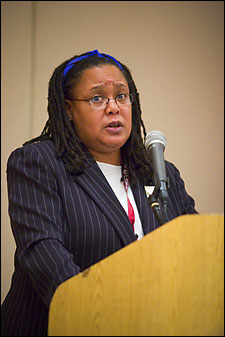Sr. Vice Provost Evelynn Hammonds addresses KSG Women’s Leadership Board
Provides update on faculty development and diversity agenda

Evelynn Hammonds, appointed in July as Harvard’s first senior vice provost for faculty development and diversity, described her mission and agenda in featured remarks at a Nov. 18 meeting of the Kennedy School of Government’s Women’s Leadership Board.
“Our mission,” Hammonds said, “is: First, to develop a University-wide consensus about the purpose and goals of faculty development and diversity at Harvard; second, to create a shared sense of mutual obligation and accountability in the achievement of those goals; and third, to provide an accurate, timely, and transparent accounting of how we’re doing and where we’re headed.”
Hammonds said that one of her biggest challenges would be “to devise new ways to make fine measurements of progress, or the lack of it. ä Part of it is also to promulgate that data as widely and as regularly as possible, so that we need no longer confront the still-common response on this issue that there simply is no problem.” She added that she would be issuing status reports each June that included statistical summaries, information on new initiatives, and analysis of “best-practice” policies at Harvard and peer universities.
Hammonds said that she looks forward to the creation of a handful of new programs and initiatives across the University by the end of this academic year. These will include a new summer residential program for undergraduates conducting research with Harvard faculty, being developed by the College — the Harvard College Program for Research in Science and Engineering (PRISE) — set to debut in the summer of 2006.
Hammonds, a professor of the history of science and of African and African American Studies, noted that she undertook her new position “not because I am a woman of color, but because I am a scholar and a scientist who wants to see Harvard get the most out of, and be the location of choice for, a truly global, and truly inclusive, pool of talent.
“We pursue the benefits of diversity,” said Hammonds, “not because they help women, or people of color, but because they help make everyone – and every organization – more productive, more insightful, more competitive, and more successful.”




